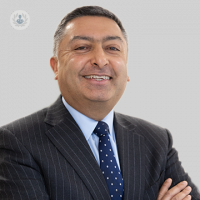A new approach for osteoarthritis – the nSTRIDE autologous protein injection could replace the need for knee arthroscopy surgery
Written in association with:nStride autologous protein injection is a new radical treatment for osteoarthritis. Tests show that 85% of patients see little or no pain in their knee following the procedure and that it even reduces the effects of osteoarthritis.
We explore how the injection works and why it is seen as an alternative to surgery, with the help of consultant orthopaedic surgeon Mr Vikas Vedi. He is the first and only surgeon currently able to provide this procedure.

What causes osteoarthritis of the knee?
Osteoarthritis of the knee (otherwise known as degenerative arthritis of the knee) is the stiffening of knee movement due to the wear and tear of the cartilage, and it's supporting structures. Osteoarthritis is the most common type of arthritis, and commonly affects people in their late 40s or older, due to the cartilage in joints gradually wearing down over time. The condition is also more common in women, in people that are overweight, and people who have had previous operations on the knee.
What is nSTRIDE autologous protein injection?
The nSTRIDE protein injection is a brand new treatment in the UK that uses protein taken from the patient’s own body to treat osteoarthritis. Autologous means ‘from your own body’ and involves a procedure where blood is drawn from the arm before being processed using a centrifuge to separate the platelet-rich plasma in the blood. The plasma is then further processed with a centrifuge to separate a protein liquid, which is then injected into the knee.
Find out: Do nStride injections have side effects?
How does nSTRIDE protein injection work?
The protein injected into the knee has been shown to protect cartilage cells, and relieve the pain associated with osteoarthritis. The protein has also been shown to block cartilage destruction in osteoarthritis, and also reverse the effects of osteoarthritis in some cases. The injection is a one-off injection that can be done in the doctor’s clinic, and the pain associated with osteoarthritis is reduced, leading to improved function of the joint. Some patients have described it as being like injecting oil into the joint.
How long does the procedure take?
Drawing blood and the injection takes around 20-30 minutes. Pain relief is usually experienced after around one week, but it is recommended that the knee is rested for two weeks. The benefits of the injections should be seen for at least 12 months following the procedure.
How much does nSTRIDE protein injection cost?
The procedure costs £1,800, and Mr Vikas Vedi is one of the only surgeons able to offer this injection in the UK. If you are interested in a consultation to find out if the nSTRIDE autologous protein injection is right for you, click here to make an appointment.



